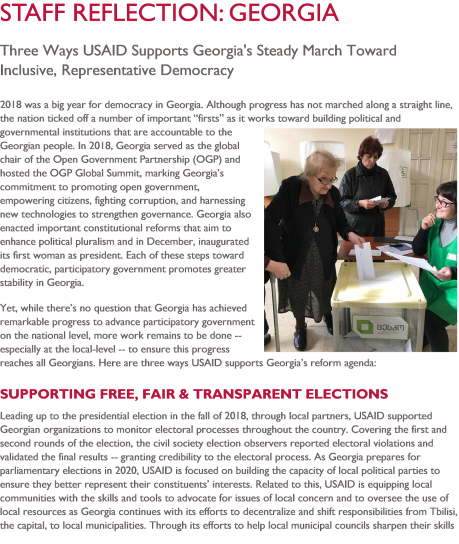Speeches Shim
2018 was a big year for democracy in Georgia. Although progress has not marched along a straight line, the nation ticked off a number of important “firsts” as it works toward building political and governmental institutions that are accountable to the Georgian people. In 2018, Georgia served as the global chair of the Open Government Partnership (OGP) and hosted the OGP Global Summit, marking Georgia’s commitment to promoting open government, empowering citizens, fighting corruption, and harnessing new technologies to strengthen governance. Georgia also enacted important constitutional reforms that aim to enhance political pluralism and in December, inaugurated its first woman as president. Each of these steps toward democratic, participatory government promotes greater stability in Georgia.
Yet, while there’s no question that Georgia has achieved remarkable progress to advance participatory government on the national level, more work remains to be done -- especially at the local-level -- to ensure this progress reaches all Georgians. Here are three ways USAID supports Georgia’s reform agenda:
Supporting Free, Fair & Transparent Elections
Leading up to the presidential election in the fall of 2018, through local partners, USAID supported Georgian organizations to monitor electoral processes throughout the country. Covering the first and second rounds of the election, the civil society election observers reported electoral violations and validated the final results -- granting credibility to the electoral process. As Georgia prepares for parliamentary elections in 2020, USAID is focused on building the capacity of local political parties to ensure they better represent their constituents’ interests. Related to this, USAID is equipping local communities with the skills and tools to advocate for issues of local concern and to oversee the use of local resources as Georgia continues with its efforts to decentralize and shift responsibilities from Tbilisi, the capital, to local municipalities. Through its efforts to help local municipal councils sharpen their skills as stewards of public resources and responsibilities, USAID strengthens Georgia’s ability to govern itself free from corruptible individuals and external actors.
Promoting Citizen Engagement
Part of building up successful political parties includes strengthening the skills of civil society to serve as advocates for Georgians’ interests and as watchdogs able to hold political parties, the judiciary and the government to account. USAID advocates for the government to engage with civil society on issues of relevance to local populations, such as waste management, judicial reform, and increasing local businesses’ access to government resources. USAID has supported the government to develop and introduce multiple tools to increase citizen engagement, providing venues for citizens to participate in the decision making process. Through tools such as interactive web-sites, the e-petitioning portal iChange, and participatory budgeting tools at select local governments, more Georgian citizens have opportunity to actively engage with their government.
USAID is also focused on supporting minority groups in Georgia. A recent report indicated that minority groups in Georgia are at a greater risk of Russian disinformation. Yet, local communities that are engaged in their governments are more resilient to external influences. USAID support helps this population access justice and defend their rights through legal means -- creating important ties between these communities and government. USAID also fosters a local independent media by providing training and resources to journalists to produce accurate and ethical reporting on public interest issues, including key government reforms, to increase access to fact-based and balanced news sources and to counter external actors’ efforts to disseminate disinformation.
Advancing the Reform Agenda
Finally, USAID remains a partner to the Government of Georgia as it pursues reforms. USAID provides technical expertise on issues such as parliamentary oversight of government institutions, policy making and legislative reform, civil service reform, and local government decentralization reform -- all critical for ensuring accountability of the Georgian government to its people. USAID supported the government in developing a new conceptual and legislative framework of civil service in Georgia and now helps with the enforcement of this effort. The new system will ensure professionalism, stability, and political neutrality of civil service. USAID also supports the Parliament as it enforces its recently adopted Rules of Procedure, which introduces new and improved oversight mechanisms. Through training, exchanges and study visits, USAID’s assistance allows Georgian judges and court personnel to improve their professionalism and understanding of American and European best practices. And finally, by working with the Parliament on legal frameworks and the judiciary and high council of justice, our partnership helps build an independent and accountable judicial system through which citizens are able to attain justice.
Looking Forward
USAID’s partnership with Georgia realizes a Georgia that is resilient to external influence and that remains a steadfast partner in a volatile region. Looking ahead in 2019, USAID will continue to support Georgians on their path towards achieving a more democratic and representative government, including ensuring transparency and accountability as Georgia moves forward with its efforts to decentralize government, prepare for parliamentary elections, and seek important legislative reforms.
The remarkable progress already underway reflects the generosity of the American people, and the hard work and tenacity of local leaders, including the government and people of Georgia. By building Georgia’s representational government, USAID supports Georgia on its journey to self-reliance, and moves us closer to the day when foreign assistance to Georgia is no longer needed.


Comment
Make a general inquiry or suggest an improvement.